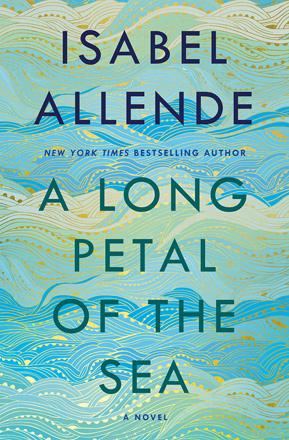You are here
From 1939 Spain to 1973 Chile
By Sally Bland - Jan 03,2021 - Last updated at Jan 03,2021

A Long Petal of the Sea
Isabel Allende
Translated from the Spanish by Nick Caistor and Amanda Hopkinson
New York: Ballantine Books, 2020
Pp. 318
In her latest novel, Isabel Allende pays tribute to Chile’s beloved communist poet, Pablo Neruda, who won the Nobel Prize in Literature in 1970, and died in September 1973, as Augusta Pinochet’s military regime came to power. (Until today, suspicions linger that Pinochet’s agents poisoned him.) Each chapter of “A Long Petal of the Sea” is graced by excerpts of his poems. It is obvious why Allende singled him out, for Neruda’s poetry elegantly and forcefully extolls both love and social justice — themes that are implicit in Allende’s own books. Other writers and artists — Spanish as well as Chilean — are mentioned in the narrative, attesting to Allende’s conviction in the importance of culture for countering war, dictatorship and displacement.
Equally pertinent is that Neruda was intimately involved with the Spanish Civil War of 1936-39, siding with the Republic against Franco’s fascist takeover, and later with the presidency of Salvador Allende in Chile (1970-73). Both these brief but pivotal democratic experiments in people’s power were violently defeated and unleashed waves of refugees fleeing the vengeance of the conquering fascist armies. Refugees also being among Allende’s concerns, the most compelling reason for her focus on Neruda is that he sponsored a ship to bring Spanish refugees to Chile, braving strong right-wing opposition. This is the second novel featuring refugees to be published by Allende in a period where the US’s crackdown on refugees has hit Latinos at the southern border especially hard. In it, the major Spanish characters, who became refugees after the fall of the Republic, manage to cross the Atlantic in the “Winnipeg” and start a new life in Chile. Over thirty years later, they risk being punished for their support to Salvador Allende’s socialist government after it is toppled in Pinochet’s coup.
Having previously published fourteen novels blending fact with fantasy, Allende does not disappoint with this one. Onto a realistically described historical stage, she places an array of imagined but ever-credible characters. In Spain, most are Catalonians and Basque on the Republican side. In Chile, she widens the perspective and sometimes the irony, entanglements and heart-break, by including characters from different social classes and persuasions.
From start to finish, the story mainly follows Victor Dalmau from Barcelona, who is working as a medic on the Republican side, despite having completed only three years of medical school. Though historical realism predominates in the novel, after three pages, Allende records one of her typically magical events that plays like reality. In the confusion of sorting the wounded to send them on for treatment, Victor encounters a young patient who seems to be dying; he has no pulse. Though Victor should be moving on to saveable patients, he cannot resist removing the boy’s bandages to find that his wound is still open. Despite all he has witnessed in the war, this is the first time he has seen an actual living heart. “Victor was never able to explain to himself why he inserted three fingers of his right hand into the gaping wound, gently grasped the organ, and squeezed it rhythmically several times… Suddenly he felt the heart coming back to life between his fingers… Years later, on the far side of the world, he still saw the soldier in nightmares.”(p. 5-6)
This incident is one of many that gives continuity to the narrative, stressing the oneness of human suffering, and the parallels between events in Spain and Chile, though separated by over thirty years.
Despite the novel’s focus on Victor, this is just as much the story of strong women. Victor sticks to his chosen path, becoming a competent and dedicated doctor, but remains a novice in affairs of the heart. Though he falls in love quickly several times on both sides of the Atlantic, he is amazingly slow to realise when true love of the lasting variety comes along. In contrast, there are several women who know what they want professionally and personally, and reinvent themselves in the process: Elizabeth, a Swiss Red Cross nurse, who sets up a maternity home for pregnant refugee women at a desperate time when the Republicans can hardly protect their own supporters; Roser, the daughter of uneducated shepherds, who is taken under the wing of a music teacher in Barcelona and becomes an accomplished, world-class musician; and Juana, the wily indigenous servant of a rich Santiago family, who knows more of their secrets than they themselves do and steers the household with an invisible hand. Last but not least, there is Carme, Victor’s mother, who defies the odds to remain in her own country and shares a common trait with the author: Keeping a diary, she “embellished the facts, because she is aware that life is how we tell it, so why would she jot down trivia?” (p. 202)
This is also the story of refugees’ resilience--the thousands who braved the treacherous journey over the Pyrenees in 1939 into France and survived the horrors of the camps where they were placed as undesirables, only to have World War II catch up with them. Yet, many of them assimilated and contributed to their host countries, such as those who embarked for Chile, fulfilling “Neruda’s dream of rousing Chilean society from its slumbers.” (p. 203)
In “A Long Petal in the Sea”, Allende shares her somewhat unconventional wisdom about life, love, growing old and dying: how a marriage of convenience could grow into a great passion; how one can rediscover love late in life; and how the past steers the present. Then, just when one thinks the novel is sliding towards a quiet conclusion, she injects a totally new character that makes the ending feel like a new beginning.
Related Articles
In the Midst of WinterIsabel AllendeTranslated from the Spanish by Nick Caistor and Amanda HopkinsLondon: Scribner, 2018Pp.
This is the sequel to “Paula”, the memoir Isabel Allende wrote in response to the tragic death of her daughter in 1992.
The Island of Missing TreesElif ShafakUK: Viking/Penguin Random House, 2021Pp.


















